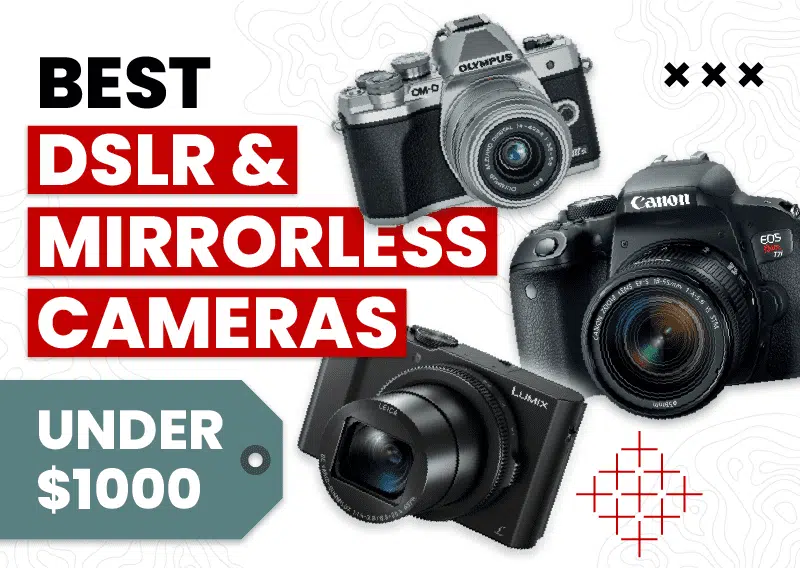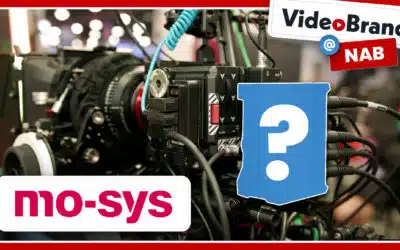If you want to shoot high-quality photos and videos with the flexibility of different lenses, you’ll need to upgrade your camera. But you don’t want to break the bank. Here are a bunch of options for mirrorless and DSLR cameras under $1000.
Mirrorless vs DSLR Cameras – What’s the Difference?
If you search the market, you will find that most new cameras are mirrorless.
DSLR cameras, though still very popular, are on the way out. They use a mirror that reflects the light up to a prism to project an image. They use the design made popular by the 35mm film cameras of the bygone era.
Pressing the shutter button causes the mirror to flip up resulting in the opening of a shutter and falling of the light onto the image sensor that clicks the final image.
In the case of mirrorless cameras, light passes directly through the lens onto the image sensor, which presents a preview on the rear screen.
Here are some of the main differences between the two:
- Videos: Mirrorless cameras can be a great pick to shoot videos. DSLRs tend to lose focus and cause blurred shots due to their inability to use the phase detection feature while recording videos. There are no such issues with mirrorless cameras.
- Size: Mirrorless cameras are smaller and easier to handle.
- Autofocus Speed: While the two are quite similar in this department, the latest mirrorless cameras offer better autofocus speeds.
- Speed: Mirrorless cameras take the cup here. They’re faster and can take more pictures than a traditional DSLR in the same amount of time.
- Lenses: DSLRs come with a wider range of lenses. However, options for mirrorless cameras are now also growing and adapters are available to convert different lens mounts.
- Previewing Images: Mirrorless cameras provide an on-screen preview, showing exactly what the final result will look like, whether using the viewfinder or LCD display. DSLRs reflect the image into the viewfinder, so you’re seeing reality, not a video preview of your photo or video. Some photographers prefer this while more beginner photographers and videographers would rather see what the final image will look like when taking it.
Best DSLR Cameras Under $1000
Canon EOS REBEL T7i with 18-55mm Lens
Our Pick: Best Canon DSLR Under $1000
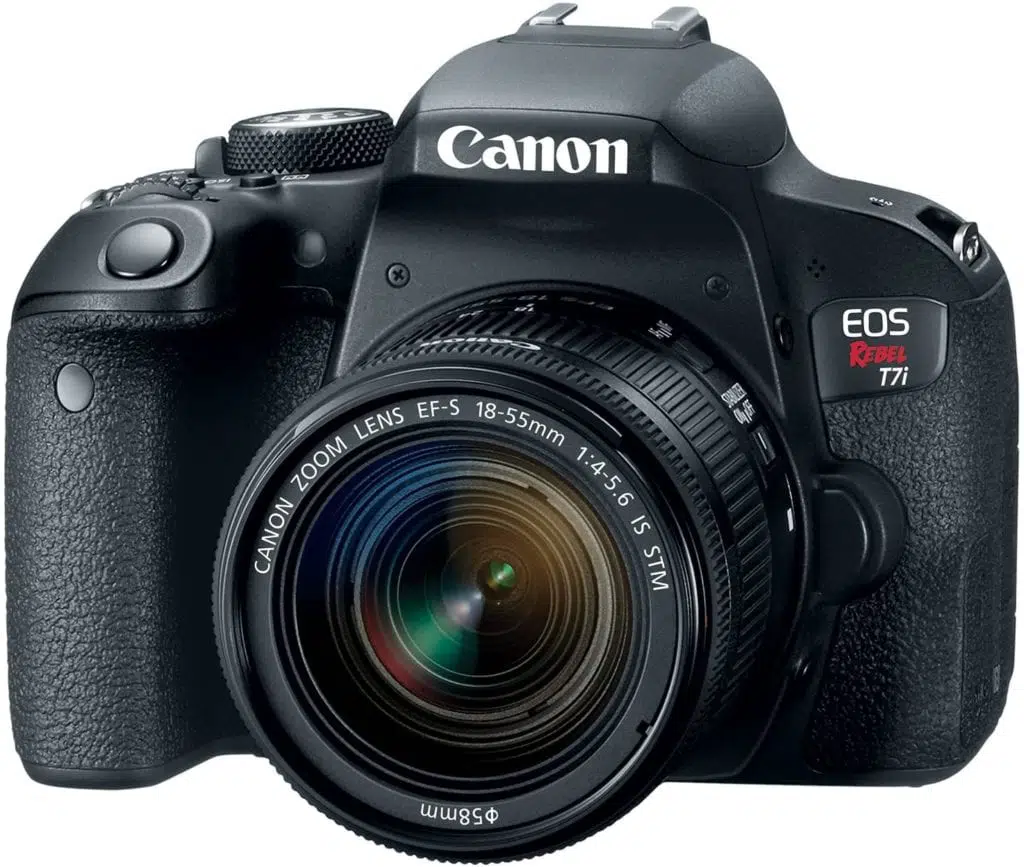
Specifications:
- User Level: Intermediate
- Resolution: 24.2MP
- Sensor Size: APS-C
- Viewfinder: Optical
- Screen: 3.0-inch vari-angle touchscreen
- Maximum Continuous Shooting Rate: 6fps
- Autofocus: 45-point cross-type Dual Pixel AF
- Movies Supported: Only 1080p
- HDMI Output: No
- Microphone In: Yes
The Rebel T7i is one of the highest-rated Canon cameras and is our pick for the best Canon DSLR under $1000.
This camera has a powerful DIGIC 7 image processor and ISO range of 100 – 25,600.
It can be a great pick to shoot videos thanks to Canon’s dual pixel CMOS auto-focusing for live-view shooting. It’s fast to track subjects and does not lose focus. While this beauty doesn’t support HDMI, it gives you the option to add an external mic.
Pros:
- Built-in Wi-Fi, NFC, and Bluetooth
- Good for beginners thanks to a helpful feature assistant interface
- Offers a good grip
- Compatible with a wide variety of lenses including Canon’s EF and EF-S lines
- Excellent battery life of 820 shots per charge
Cons:
- Does not have an internal GPS
- Doesn’t give the option to change Auto ISO minimum shutter speed
$799
Canon EOS 250D with 18-55mm Lens and Kit
Our Pick: Best 4K DSLR Under $1000
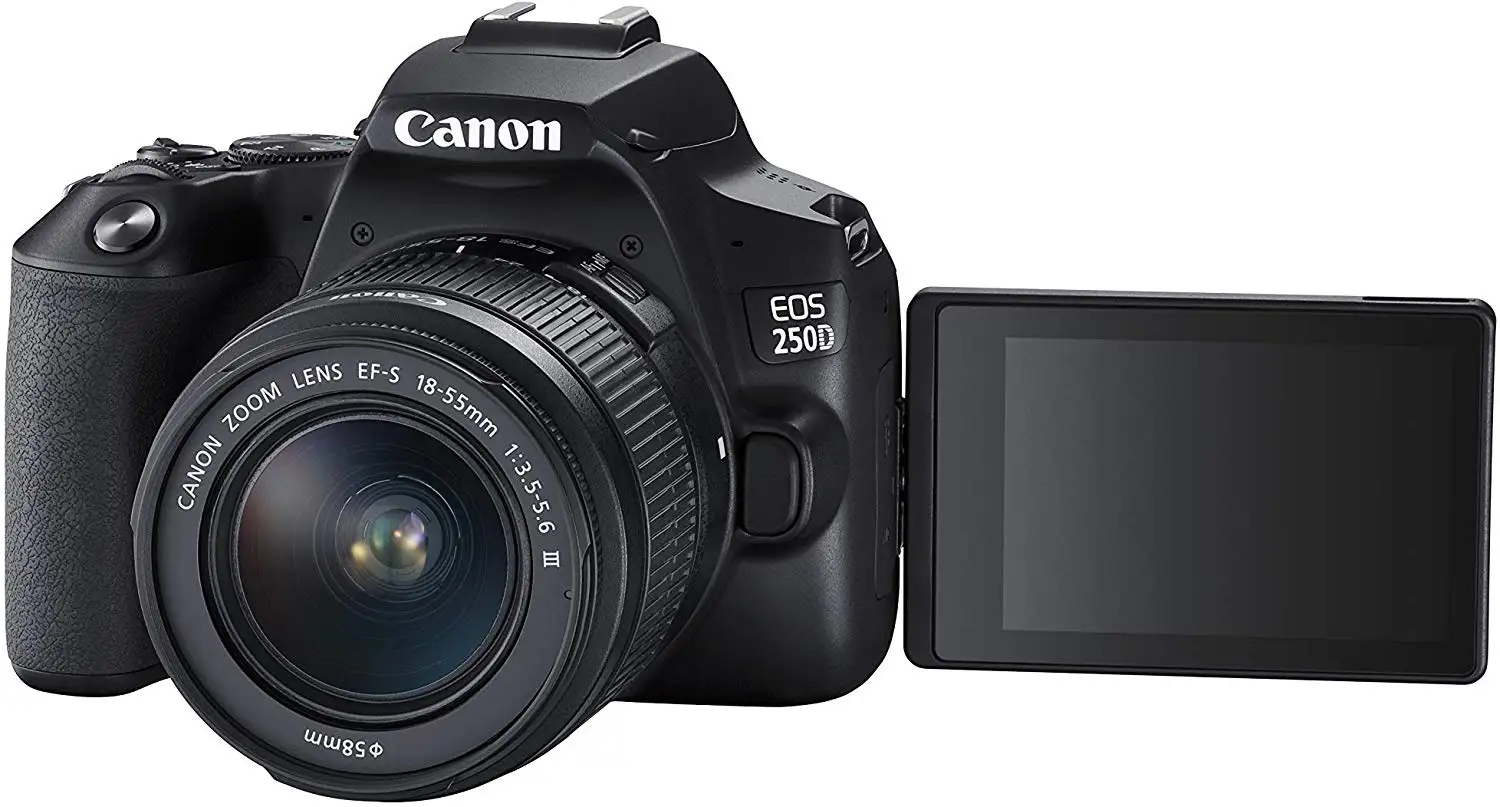
Specifications:
- User Level: Beginner
- Resolution: 24.1MP
- Sensor Size: APS-C
- Viewfinder: Pentamirror, approx. 95% coverage
- Screen: 3-inch vari-angle touchscreen, 1.04 million dots
- Maximum Continuous Shooting Rate: 8 fps
- Autofocus: 9-point AF system, Dual Pixel CMOS AF
- Movies Supported: 4K UHD (up to 25/24p)
- HDMI Output: Yes
- Microphone In: Yes
Also known as Canon EOS Rebel SL3, the EOS 250D appears a little dated but still quite popular among people looking for an affordable 4K camera. It focuses quickly and uses its own Image Stabilizer system to ensure you get steady and sharp results.
The camera accepts both EF and EF-S lenses; however, it does lack some 4K shooting features that you will find on other 4K cameras. You can only shoot in 24p. Moreover, videos are subject to crop, which means you will not get the most use out of the image sensor. You will, however, not face such issues when shooting standard or full HD videos. Also, the Dual Pixel CMOS AF system reduces resolution during 4K shooting.
Consider adding an external mic for better results.
Pros:
- Lets you easily tailor color, sharpness, etc.
- The LCD works well in daylight
- Lightweight and easy to carry
- Long battery life (1,000+ shots)
Cons:
- The AF system is outdated
- The kit lens doesn’t leave a solid impression
$749
Nikon D5600 with 18-55mm Lens and Kit
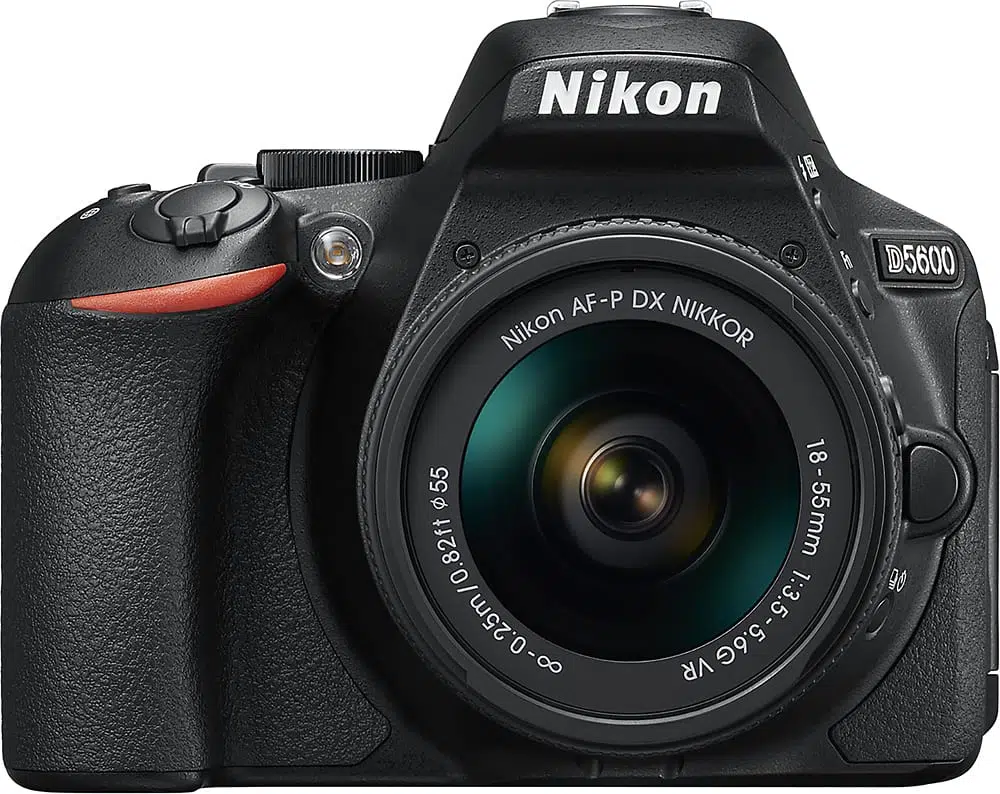
Specifications:
- User Level: Intermediate
- Resolution: 24.2MP
- Sensor Size: APS-C CMOS
- Viewfinder: 2360k dots
- Screen: 3.2-inch vari-angle touchscreen, 1,037,000 dots
- Maximum Continuous Shooting Rate: 5 fps
- Autofocus: 39-point AF, 9 cross-type
- Movies Supported: 1080p up to 60 fps
- HDMI Output: Yes
- Microphone In: Yes
This 2018 model is still popular among users due to its mixed features that make it suitable for both experienced and beginner users. While it lacks extraordinary features, it offers a nice mix in the form of an impressive autofocusing system and touchscreen.
This can be a nice pick to click images as it offers sharp colors and nice details, especially when clicked at lower ISO settings. Results, however, start to suffer at ISO 6400.
Thanks to an audio jack, it is possible to attach an ME-W1 Wireless Microphone or ME-1 Stereo Microphone to the camera. Plus, it has an HDMI output as well.
Pros:
- The polycarbonate shell is quite durable and comfortable
- Produces excellent images
- The dynamic range works well in different situations
- The buttons are very nicely placed
- Offers remote access
Cons:
- No outstanding features
- Feels a little outdated
$749
Canon EOS 80D with 18-55mm Lens and Kit
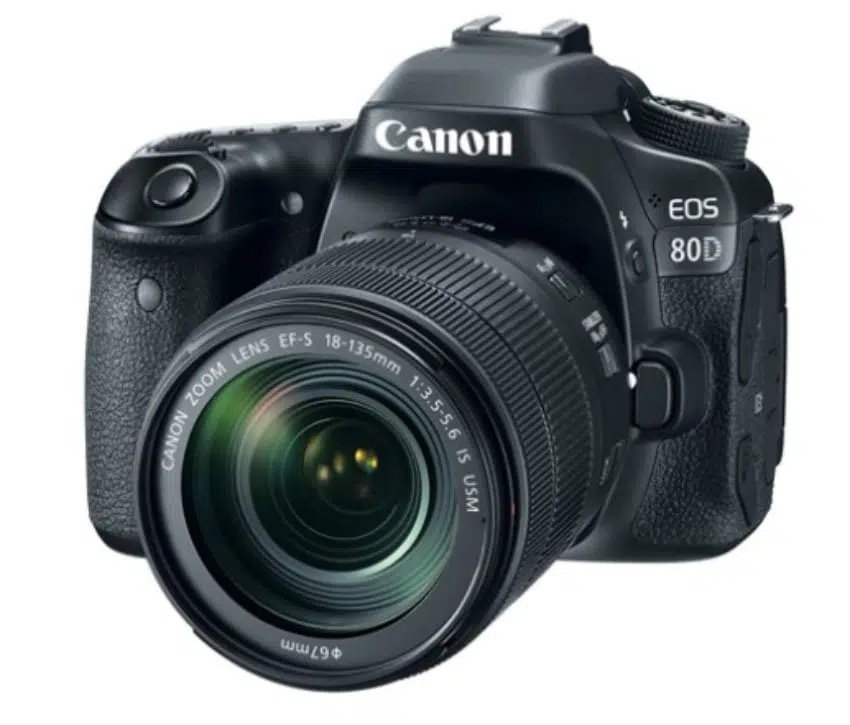
Specifications
- User Level: Intermediate
- Resolution: 24.2MP
- Sensor Size: APS-C
- Viewfinder: Optical
- Screen: 3.2-inch articulated touchscreen, 1040k dots
- Maximum Continuous Shooting Rate: 7fps
- Autofocus: 45-point cross-type Dual Pixel AF
- Movies Supported: Full HD at 60 fps
- HDMI Output: Yes but with camera data
- Microphone In: Yes
The EOS 80D does not look very impressive on paper, yet it’s one of the most popular Canon cameras due to its ability to snap great photographs.
It’s good at locking and tracking subjects thanks to its Digic 6 processing engine. It has a sensitivity range of ISO 100 – 16,000 and a maximum expansion value of ISO 25,600. This device has a lot in common with its predecessor, the 70D.
Made for photos, the camera offers a burst depth of 25 raw files when using a UHS-1 SD card. For those interested in videos, this one lets you connect an external mic; however, HDMI doesn’t offer a clean image output and the maximum recording limit is 29:59 minutes.
Pros:
- Excellent battery life
- Consistent and fast autofocusing
- Solid aluminum alloy frame that is weather resistant
- The screen is great
- The menu is very easy to use
Cons:
- No in-body image stabilization
- Records Full HD video only up to 60fps
$999
Nikon D3500 with 18-55mm Lens
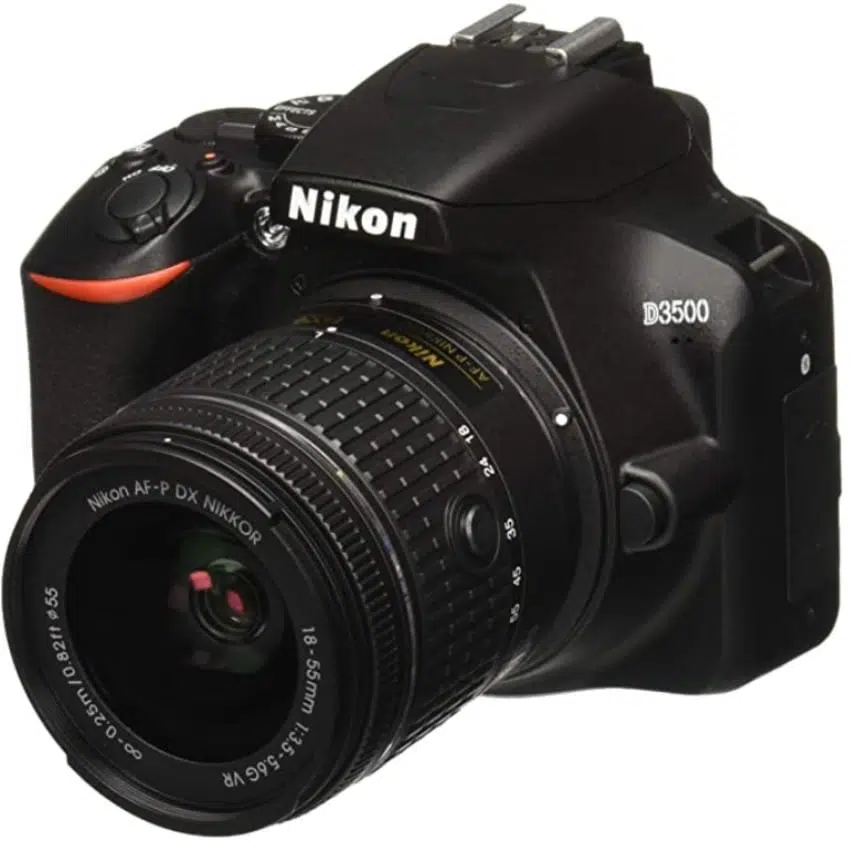
Specifications:
- User Level: Beginner
- Resolution: 24.2MP
- Sensor Size: APS-C CMOS
- Viewfinder: 2360k dots
- Screen: 3.0-inch, 921,000 dots
- Maximum Continuous Shooting Rate: 5 fps
- Autofocus: 11-point AF, 1 cross-type
- Movies Supported: 1080p and 720p In full HD, it can shoot at 24, 25, 30 , 50, and 60 fps
- HDMI Output: Yes
- Microphone In: No
The D3500 is popular among new users who want to learn photography and get used to handling a DSLR.
Despite the low price tag, the unit comes with some nice features including a cool retracting kit lens; However, we must mention that it has two versions of the lens. Consider getting the more expensive one. It costs about $20 more but can offer great image stabilization.
Connecting this one to an external device, such as a monitor, is easy thanks to an HDMI port.
Pros:
- One of the most affordable DSLR cameras
- Very easy to use and carry
- Excellent battery life – 1,550 shots
- Comes with a useful Guide mode
Cons:
- Only offers basic functionalities
- Does not have a touchscreen
$553
Nikon D3400 with 18-55mm Lens
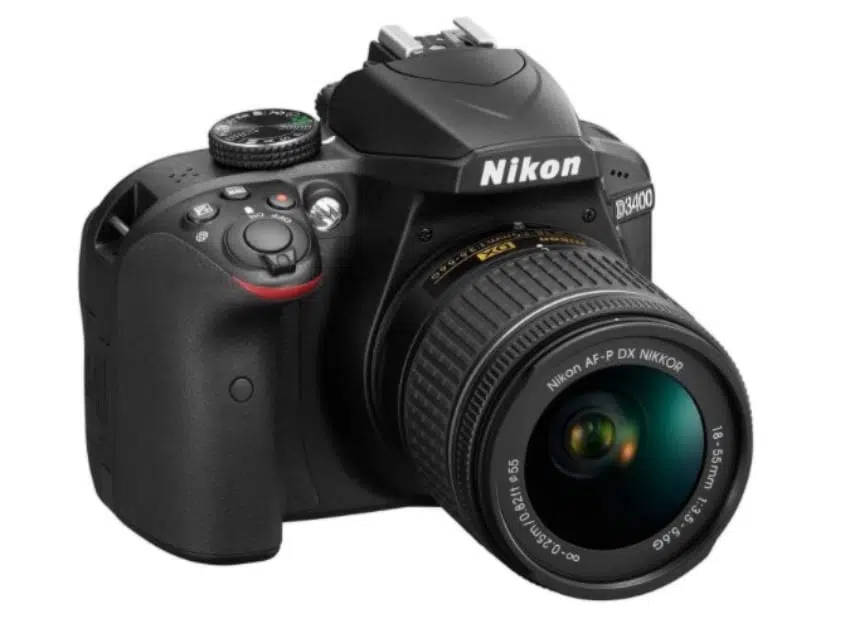
Specifications:
- User Level: Intermediate
- Resolution: 24.2MP
- Sensor Size: APS-C CMOS
- Viewfinder: Optical
- Screen: 3-inch, 921K dots
- Maximum Continuous Shooting Rate: 5 fps
- Autofocus: Manual and auto
- Movies Supported: 1080 at 24, 25, 30 , 50, and 60 fps.; 720 at 60 and 50 fps
- HDMI Output: Yes
- Microphone In: No
The Nikon D3400 proved to be a major success when it came out. The D3500’s 24.2MP sensor works well but it might be a good idea to add some additional lenses.
Its sensitivity range of 100-25,600 is quite impressive. Despite the low price tag, it can be a good camera for videos. It can shoot at 60/50p, 30/25p, and 24p, with the option to go for lower-resolution recordings.
This camera doesn’t have a mic input, however, you can connect it to external devices using an HDMI cable.
Pros:
- Excellent battery life of 1,550 shots
- Remote functioning thanks to Bluetooth
- A great all-rounder camera under $1000
Cons:
- No touchscreen
- Does not give the option to attach an external mic
$458
Canon EOS 77D – Body Only
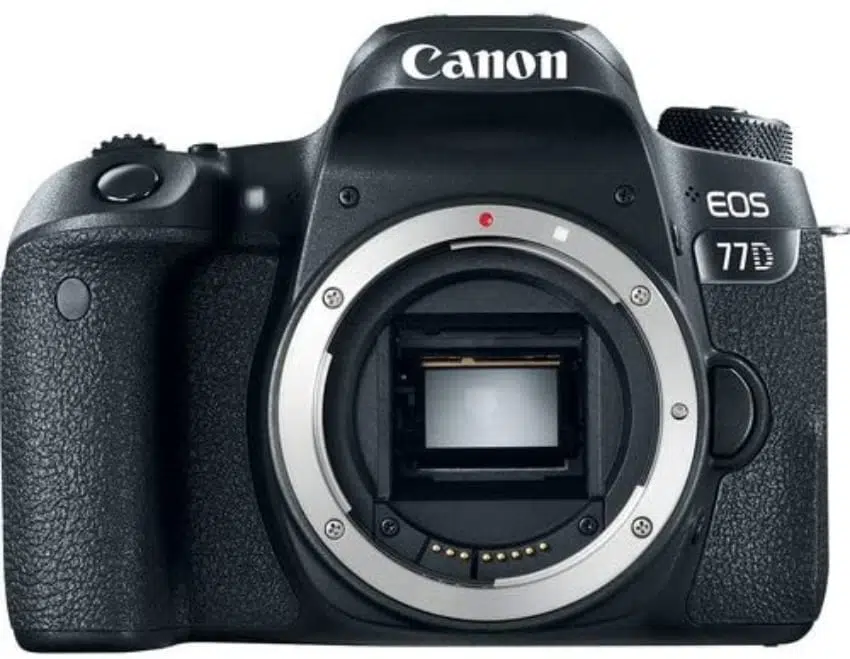
Specifications:
- User Level: Entry level
- Resolution: 24MP
- Sensor Size: APS-C
- Viewfinder: only 95%
- Screen: 3.0-inch vari-angle touchscreen, 1,040,000 dots
- Maximum Continuous Shooting Rate: 6fps
- Autofocus: 45-point AF
- Movies Supported: Full HD 1080p
- HDMI Output: Yes, not clear
- Microphone In: No
This DSLR has a sensor size of 22.3mm x 14.9mm with some great features such as the ability to shoot HDR and time-lapse movies.
You will find a lot of similarities between this and some high-end models from Canon. This beauty has the same sensor as the Canon EOS 80D. Plus, it has a DIGIC 7 image processor with an ISO sensitivity of 100- 12800.
One of its main features is its auto-focusing system that uses Canon’s popular 45-point all cross-type option that can lock focus both vertically and horizontally. Plus, it also has the dual-pixel CMOS auto-focusing feature, making it a good option to shoot videos. You can get maximum image stabilization when using either the EF-M 15–45mm f/3.5–6.3 IS STM or the EF-M 18–150mm f/3.5–6.3 IS STM..
Pros:
- Great to shoot videos as it does not lose focus
- Has the option to connect an external mic
- The screen is pretty impressive
- Built-in Wi-Fi, NFC, and Bluetooth
- Battery life is good – 600 shots
Cons:
- Shoots stills at a rate of 6 fps, which is slower than some other options
- Doesn’t have a mic output jack
- Lacks a clean HDMI
$599
Nikon D7500 – Body Only
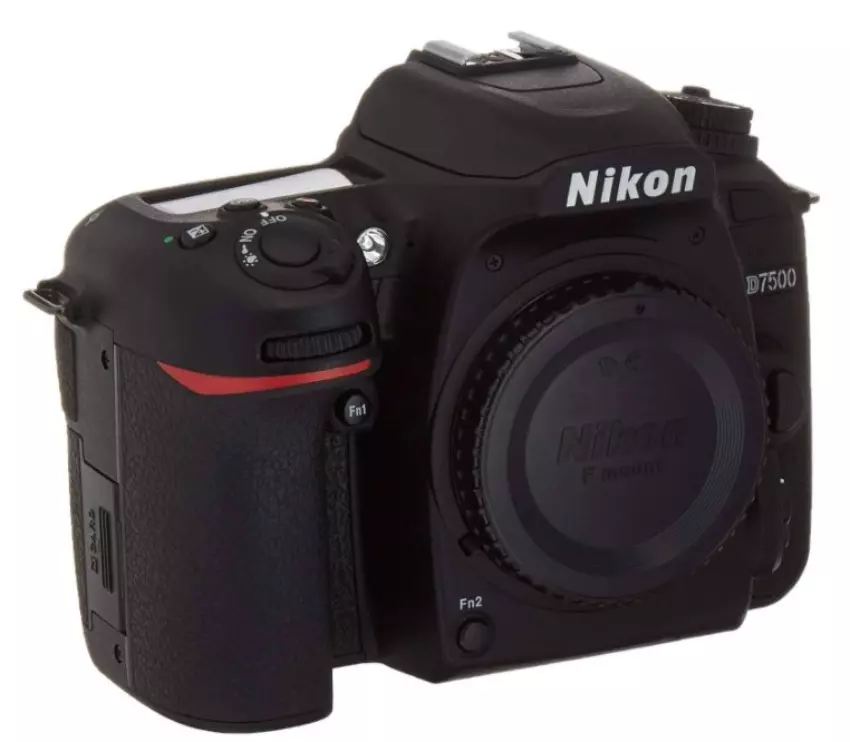
Specifications:
- User Level: Enthusiast
- Resolution: 20.9MP
- Sensor Size: APS-C
- Viewfinder: 2360k dots
- Screen: 3.2-inch fixed, 922k dots
- Maximum Continuous Shooting Rate: 8 fps
- Autofocus: 51-point AF, 15 cross-type
- Movies Supported: 4K at 30p
- HDMI Output: Yes
- Microphone In: Yes
The Nikon D7500 can be a great pick for users interested in a reliable DSLR. It uses an EXPEED 5 imaging processor and a number of technologies found in the pricier Nikon model, D7500.
This camera can be a great pick to capture fast-moving objects. It can be great to snap sporting events. While this camera records in 4K, it has a limit of 29 minutes and 59 seconds. Moreover, it only has one SD slot.
Pros
- The AF system is very quick
- Safe to use in all weather conditions
- Can be controlled remotely
- The sensor is quite impressive
Cons
- Does not offer WiFi functionality
- The LCD screen is of low quality
- Only 1 SD card slot
$999
Best Mirrorless Cameras Under $1000
Olympus OM-D E-M10 Mark III with 14-42mm Lens
Our Pick: Best Mirrorless Camera Under $700
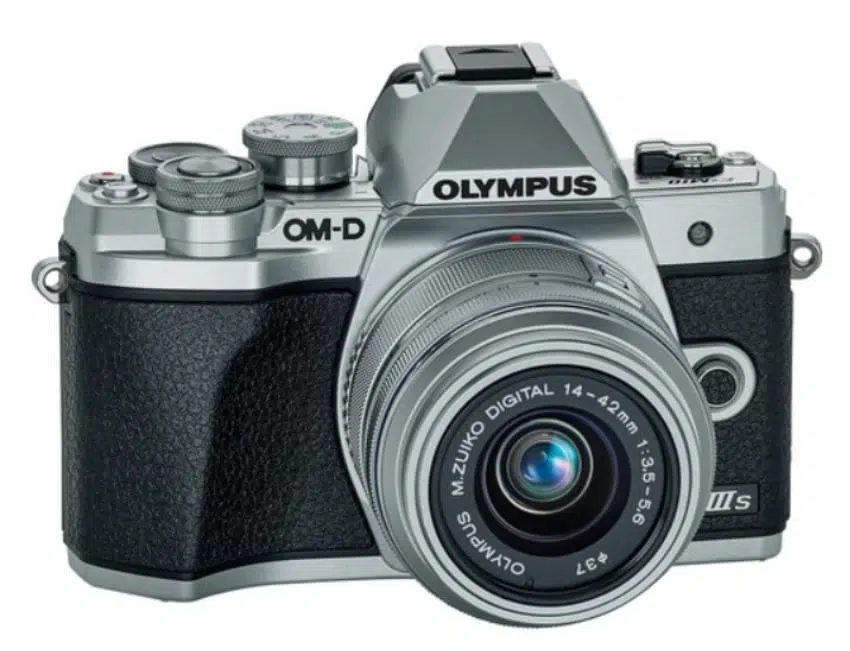
Specifications:
- User Level: Enthusiast
- Resolution: 16MP
- Sensor Size: Micro Four Thirds Live MOS sensor
- Viewfinder: AF Targeting Pad
- Screen: 3 inch fixed touchscreen
- Maximum Continuous Shooting Rate: 8.6 fps
- Autofocus: 121-point AF
- Movies Supported: 4K
- HDMI Output: Yes
- Microphone In: Yes
Many call The Olympus OM-D E-M10 Mark III the best mirrorless camera under $1000 with a microphone jack and HDMI port.
Don’t let the retro design of this camera fool you, it comes with some brilliant features including a touchscreen, Face Priority AF, and Eye Detection AF. The ISO range is quite impressive at 100-25,600.
The TruePic VIII sensor works well in all conditions including low light. The technology can detect light and suggest settings. The camera offers a 5 axis image stabilization technology that works well.
It has a mechanical shutter up to 1/4000 sec, which makes it one of the fastest units out there in this price range.
Pros:
- The battery offers about two hours of continuous shoot
- Several video modes such as HDR, long exposure, and bracketing
- Lightweight and easy to use
- Durable magnesium alloy construction
Cons:
- The screen is fixed and rigid
- Battery life could’ve been better – 330 shots
$599
Panasonic Lumix DMC-LX10
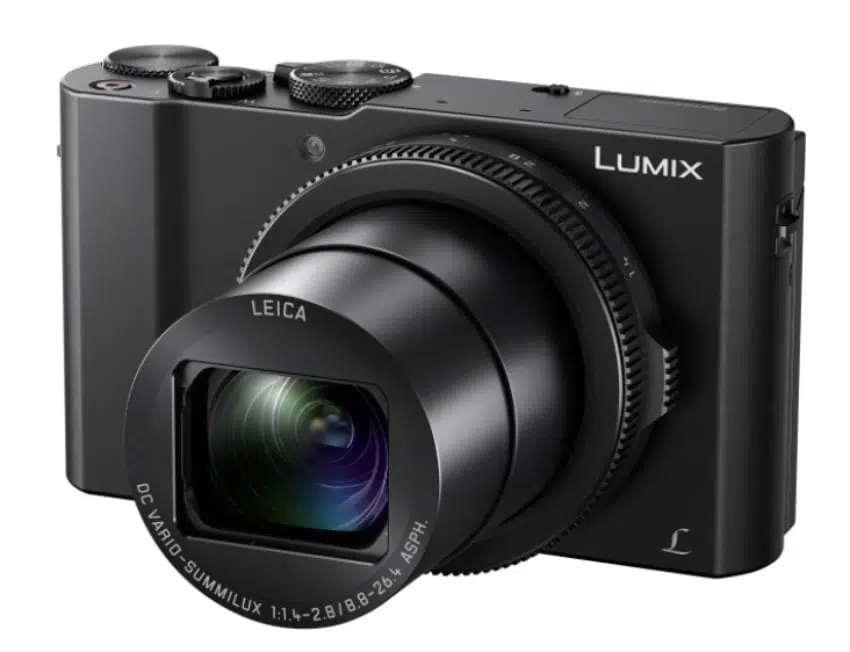
Specifications:
- User Level: Beginner
- Resolution: 20.1MP
- Sensor Size: .0-inch CMOS sensor
- Viewfinder: –
- Screen: 3.0-inch, 1.04 million dot resolution
- Maximum Continuous Shooting Rate: 6 fps
- Autofocus: 11-point AF, 1 cross-type
- Movies Supported: 1080p, 4K (840 x 2160 pixels)
- HDMI Output: Yes
- Microphone In: –
With a 24-72mm f/1.4-2.8 zoom lens, the Lumix DMC-LX10 is one of the best 4K mirrorless cameras. Despite some missing features, it makes an impression due to its small size and a sensitivity range of ISO 125 – 12,800.
Since we’re talking about the best 4K cameras here, let us add that this one shoots at a maximum frame rate of 30 fps with 25 fps and 24 fps options also available. The result is enhanced thanks to additional features like a 4K Live Cropping option that lets you zoom. Plus, it also has the ability to pull 4K frames from the footage.
Pros:
- The lens has an impressive travel range of 24-72mm
- The screen can be tilted and rotated
- Bright f/1.4 aperture when shooting at wide angles
- The autofocus feature works well
- Comes with micro-HDMI type D (3)
Cons:
- No viewfinder or the ability to add an external one
- The battery life is short (260 shots)
$497
Nikon Z50 with 16-50mm Lens
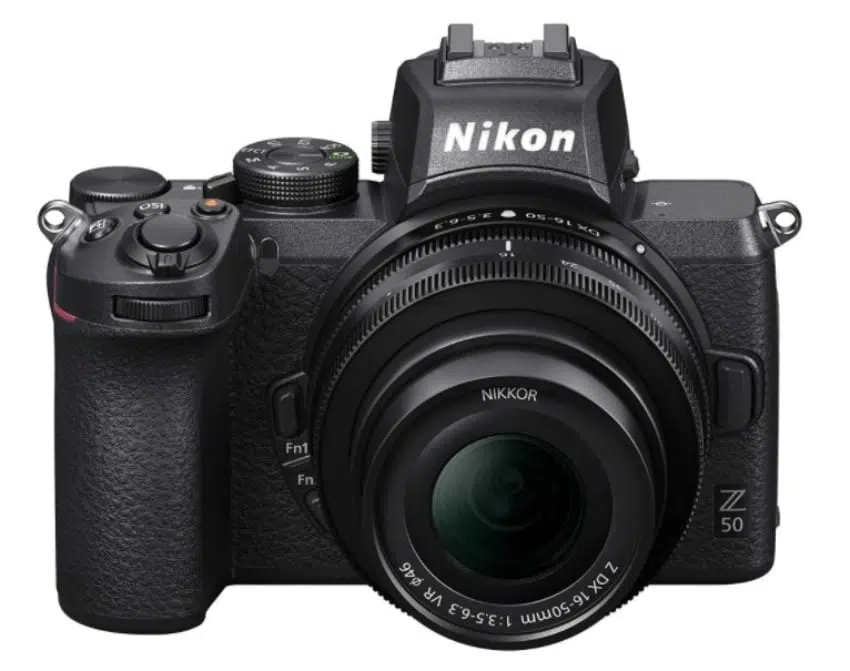
Specifications:
- User Level: Enthusiast
- Resolution: 20.9MP
- Sensor Size: APS-C
- Viewfinder: 2360k dots
- Screen: 3.2-inch touchscreen, 1036k dots
- Maximum Continuous Shooting Rate: up to 11 fps
- Autofocus: 209-point phase detection
- Movies Supported: 4K at 30 fps
- HDMI Output: Yes
- Microphone In: Yes
The Z50 is a highly competitive and well-made mirrorless camera under $1000 with a microphone jack and HDMI port.
This Nikon camera can be called a trimmed-down version of the company’s more-popular full-frame Z-camera range.
Its minimal design makes it easy to use. Plus, its touchscreen can be flipped down below the camera making it a good pick to click selfies or create vlogs.
Like most Nikon cameras, it has a thumb-rest and deep grip, which makes it fun and easy to use.
Pros:
- One of the fastest cameras
- Compatible with a wide variety of lenses
- Has a large 55 millimeter lens mount
- Built-in Bluetooth and WiFi
Cons:
- Battery life could’ve been better – 300 shots
- This best mirrorless camera under 1000 is a little bulky
$996
Sony Alpha A6100 – Body Only
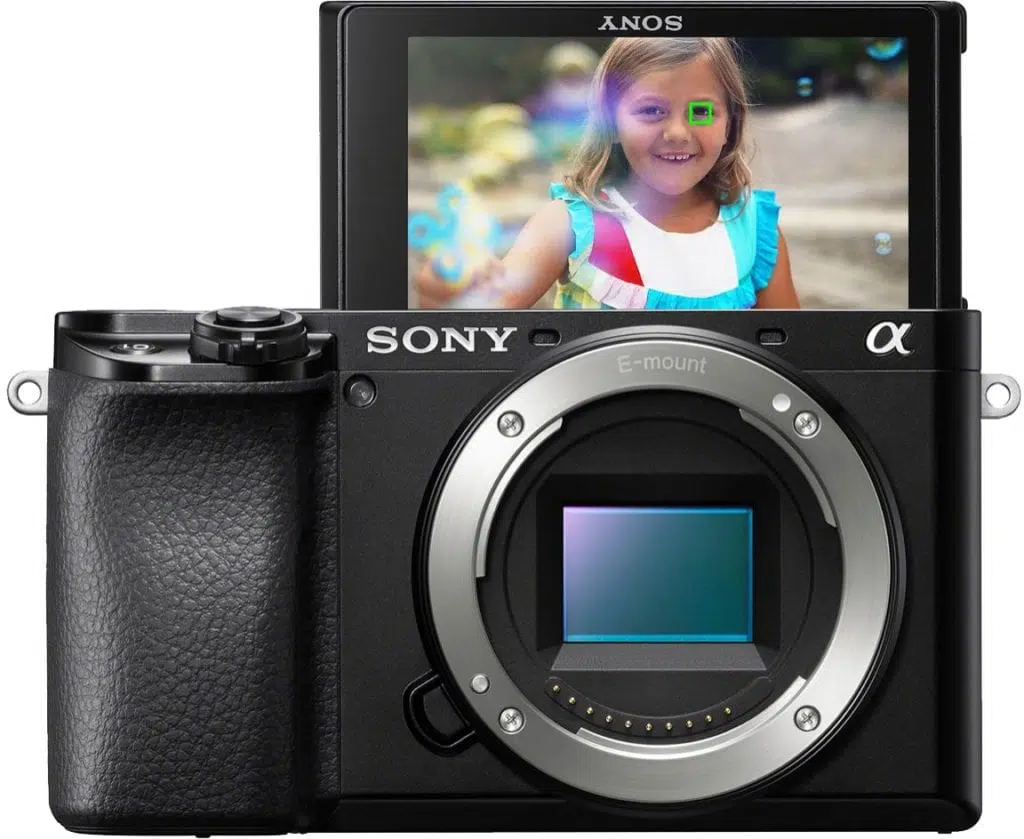
Specifications:
- User Level: Entry level
- Resolution: 20.9MP
- Sensor Size: APS-C
- Viewfinder: 425-point phase detection autofocus
- Screen: 3-inch 922K-dot tilting touchscreen
- Maximum Continuous Shooting Rate: up to 11 fps
- Autofocus: 425 selectable points
- Movies Supported: 4K video at 30fps, 100Mbps
- HDMI Output: Yes
- Microphone In: Yes
The Sony A6100 is Sony’s best mirrorless camera under $1000. A successor to Sony A6000, this mirrorless camera features 1200-zone evaluative metering and impressive continuous tracking autofocus.
The Bionz X processor works well and the camera is suitable for both low and bright conditions. Moreover, it has a 3.5mm microphone input and a clean HDMI output.
It can produce very high quality 4K videos with vibrant colors. ISO range of 100-32,000 is good especially since it is extended to ISO 51,200.
The camera offers an excellent resolution of 6000×4000. You can reduce the PPI to get better results. The camera supports multiple lenses; however, the 16-50mm Power Zoom kit lens isn’t very impressive.
The features of the A6100 are very similar to its full frame sibling, the Sony a7S III. That said, the A6100 is the closest you’ll get to a full frame mirrorless camera under $1000.
Pros:
- NFC, Bluetooth, and Wi-Fi connectivity
- Decent battery – around 420 shots
- Very easy to use
- Excellent image quality
Cons:
- No IBIS for video
- The touchscreen comes with limited features
$749
Best Video Camera Under $1000
Perhaps you have no interest in taking still photos, or want the ergonomics of a different type of camera body. We’ve got you covered with these video cameras under $1000.
GoPro HERO9 Black
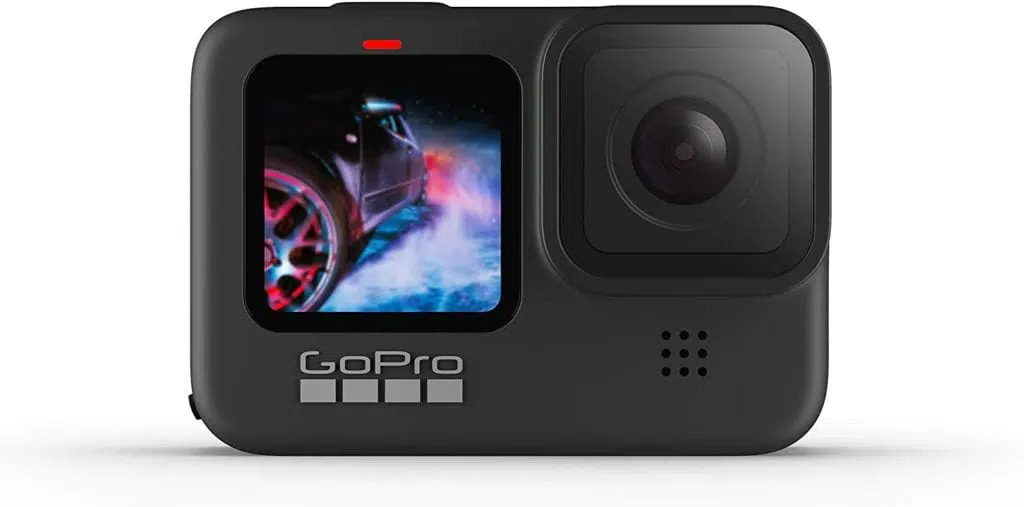
Specifications:
- User Level: Advanced
- Resolution: 23.6MP
- Sensor Size: –
- Viewfinder: –
- Screen: 1.4 inch color display
- Maximum Continuous Shooting Rate: –
- Autofocus: –
- Movies Supported: 5K 30p video
- HDMI Output: Yes
- Microphone In: Yes
Available in different variations, the GoPro HERO9 is one of the best video cameras. Beating all other cameras on this list, this one delivers 5K video with incredible details. The front display makes it perfect for vlogging and action. However, it lacks features you’d expect in a traditional camera.
The camera can live stream in 1080p on social media and click 20 MP photos. It uses GoPro’s HyperSmooth 3.0 technology that offers excellent stabilization. You can also connect external mics and monitors via HDMI.
Pros:
- The TimeWarp 3.0 is excellent
- Comes with a mounting buckle, thumb screw, carrying case, and curved adhesive mount
- Waterproof hence perfect for outdoors
- You can shoot in 8x slow motion
- Bluetooth supported
Cons:
- Not perfect for users looking for a traditional camera
- Can overheat in less than two hours
$449
Panasonic HC-WXF991K
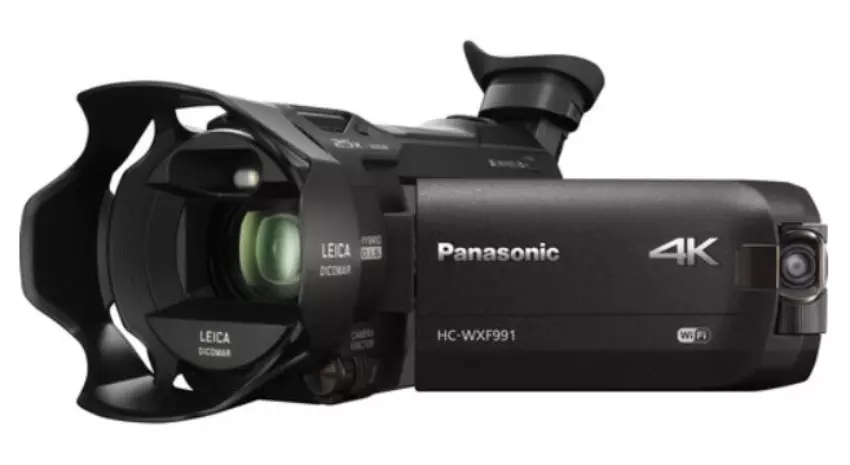
Specifications:
- User Level: Intermediate
- Resolution: 8.29MP
- Sensor Size: ¼” MOS Sensor
- Viewfinder: Electronic Viewfinder
- Screen: touchscreen 270 degrees rotatable
- Maximum Continuous Shooting Rate: –
- Autofocus: –
- Movies Supported: 4K UHD video at 24/30 fps; 1080p video up to 60 fps
- HDMI Output: Yes
- Microphone In: Yes
Looking for a video camera under $1000 that gives you the feel of a pro? Get your hands on the Panasonic HC-WXF991K. This camcorder has a bunch of additional 4K features that make it a great video camera.
With its twin camera setting, you will be able to record a shot from multiple angles. Plus, it even lets you edit 1080p videos in-camera to save time. With 20x zoom and 5-axis Hybrid Optical Image Stabilization, it is a powerhouse that comes with additional features including Dolly Zoom and slow and quick motion.
This video camera has a lot of features such as an HDMI port that can make it a little difficult to use for a new user, so take your time and learn to benefit from its incredible power.
Pros:
- Excellent WiFi features
- Uses level-shot technology to adjust image and reduce shaking
- Ustream allows users to stream live
- Lets you connect an external mic
- The zoom feature is brilliant
Cons:
- Images are not very crisp
- Short battery life
$997
Wrap Up
These were some of the best DSLR and mirrorless cameras under $1000. We studied the market and picked some of the most reliable options from a variety of makers to help you choose the right one.
It is important that you choose a camera according to your requirements. For example, the GoPro HERO9 camera can be a great choice for users interested in live-action; similarly, the Nikon D7500 can be a great pick for users interested in ease of use. If you’re on a budget, make sure to pick up a camera that includes a lens so you can get shooting right away.
Compare all these options and choose a camera that meets your requirements. A DSLR or mirrorless camera under $1000 may not have all the features that high-end cameras come with but if you look around, you will easily find something solid.

